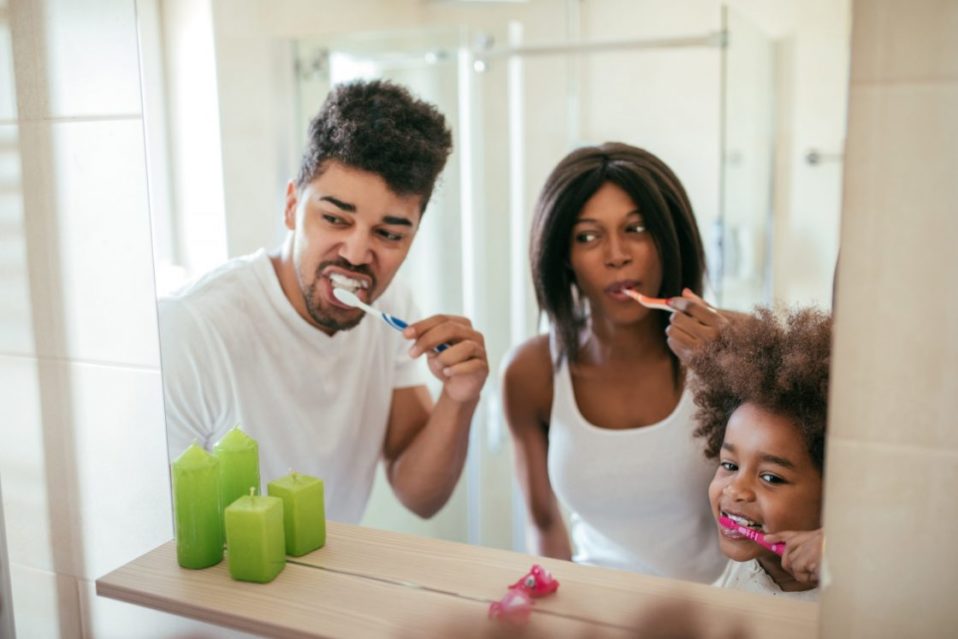A Guest Post By Helen Bradford
We all know that good hygiene is taught at a young age. It’s taught at such a young age that we don’t even question it later on. Brushing our teeth in the morning and before bed simply became a part of our schedule, and we know it’s for the best. However, there are some other tips regarding oral care that we should try to pass on to our kids.
Make It a Habit
I think you’ll agree that there’s no sense in explaining bacteria and proper oral care to children. In the beginning, we need to be patient and focus on making it a habit. Later, you can easily explain the benefits of good hygiene, including what not to do.
Be persistent and pay attention to them in the beginning, because they might not find it too interesting. It may even be strange for them, as they’re used to eating whatever they put in their mouths. As mentioned prior, have patience and make up a sort of reward system. For instance, grab a calendar and mark days with stars. Every 10 days that you’ve washed your teeth together, make something special for dinner or go to the park. These kinds of rewards work on us even when we’re adults, so they’re going to work on the kids too.
Regarding this, make sure to go shopping for a new toothbrush every three months or so. Maybe even earlier, depending on its condition. A worn or fuzzy toothbrush can damage your gums and can’t do its job properly. When you’re getting a replacement, think about getting an electric toothbrush as well. They come with several advantages over ordinary brushes, and can make the experience more fun.
One last tip – don’t wait until bedtime. When we’re tired, everything becomes a chore. Instead of waiting until bedtime, make it a routine to brush teeth following dinner.
Share Snacks, Not Your Toothbrush
Popcorn, crisps, and pringles are the types of snacks where everyone wants to join in, and there’s often no harm in sharing. Nonetheless, this is one of the few situations where we need to forget that sharing is caring. Lending pacifiers, toothbrushes, and any other utensils is a huge mistake, as you can easily transfer bacteria and viruses.
Many people cringe and are repulsed at the thought of someone else using their toothbrush, even their partner. On the other hand, a surprisingly large number of people don’t find it even slightly strange or dangerous. Let’s face the facts for a moment. Our mouths are home to hundreds of different types of bacteria, some beneficial to us and others – less so. Sharing pacifiers can be risky because in most cases those kids haven’t had a chance to build up a strong enough immune system to repel huge waves of bacteria.
Lending someone a toothbrush, though, is simply counterproductive and outright dangerous. Look at it this way: someone scraped plaque and bacteria off of their teeth, and then you’re rubbing the same material on your own. Colds, flu, herpes, and a whole variety of diseases can be transferred this way. The chances are even higher if the person we’re sharing with has weak gums, which can cause bleeding when they brush their teeth.
Eating Healthy
Since we’ve previously mentioned snacks, let’s explain a bit more. Many parents often wonder how much unhealthy food their kids can eat before it becomes a problem. There isn’t an exact measure, but the solution to this is to steer them into healthy snacks early on.
Constantly munching on things is how many children spend their day, but this can be beneficial. As long as they keep their hunger at bay, they can focus on school and every other task they’re given. Still, it’s important to stick to a schedule. Unplanned snacking will mess up their appetite, so the general rule is to let them enjoy two snacks per day. And preferably not a bag of chips, but instead some fruit or a few cookies.
The point of keeping snack-time in check is to limit the harm that junk food can cause. The two main culprits that send children to the dentist are sugar and acid. This is why there’s an eternal debate on whether or not sugary drinks are safe for our kids.
And while we’re at the topic of food, I’d like to propose that we ALL forget about the 5-second rule. Once it was trendy and people would joke around it, but some wholeheartedly believed in the rule.
The 5-second rule states that if food falls on the ground, we have 5 seconds to pick it up and eat it. If we succeed, there’s no harm. In reality, bacteria need less than a second to dive into whatever you may have dropped. If we take in germs in this manner, this is horrible for our oral care and general health as well.
Chewing Non-Food
Aside from the potential danger of choking on something, chewing on toys can damage children’s teeth. This is why we need to be persistent and correct them whenever we can.
Encourage them to stop sucking their fingers, even though it has an incredibly soothing effect on them. If this doesn’t stop in their first few years, there may be some long-term damage. Chewing on pens and pencils can create irregular spaces between their teeth. These types of conditions are surprisingly common and extremely difficult to correct, requiring a lot of time. Reminding them now and again is going to be enough, there’s no need for any type of punishment.
Tongue Scraping
If you haven’t heard of tongue scraping, you’re lucky. However, it’s an element of oral care that is just as important as flossing, so you should at least try it out.
To briefly explain, tongue scraping is a method of removing excess bacteria from the surface of our tongue, and it comes with several benefits.
It can improve our sense of taste.
The results of extensive research show that a thick enough layer of bacteria can block our receptors, albeit slightly. After we adopt the habit of scraping, we may notice an improvement in taste.
You can remove that ugly white coat.
Excess debris presents itself as a white layer on top of your tongue. Daily scraping will help clean your tongue sufficiently and prevent this coat from returning.
Your bad breath will go away.
In most cases, we can’t tell if we have bad breath unless we’re purposely checking. Usually, it’s an unlucky friend that noticed before deciding to tell us.
To be frank, tongue scraping is not the most comfortable experience. For many of us with a strong gag reflex, simply brushing our teeth can sometimes go sideways. However, some of us have recently stumbled upon a solution. If scraping is an issue for your children as well, why don’t you buy a more comfortable and delicate tongue cleaner for them to try?
Flossing
Dentists often mention flossing as a key part of dental health. If so, why do so many of us skip this step?
If we stay true to the best oral care habits, we should start flossing our children’s teeth as soon as their first two teeth touch. Removing plaque and whitening our teeth is the minimum of what we can achieve. People with bleeding gums are often afraid to floss because they think it can cause even more damage. The only facts that come from experience support the opposite. The gums of people who would brush and floss two times daily bled substantially less, over time.
The two largest problems that may pop up if you don’t floss are gingivitis and cavities. Certain types of bacteria can irritate your gums and inflame the tissue, breeding more bacteria and eventually causing gingivitis. As string is the only thing that can fit between our teeth, it’s the only way to keep our dental hygiene on a high level.
Dentophobia
Yes, the fear of dentists has become so common that there is an actual term for it. A quarter of all people living for America, for example, feel anxious or distressed when it’s time to visit the dentist. While some people may be afraid of the doctor himself, elements can make someone feel uneasy.
- Needles are a huge problem. Whenever we go to the hospital, we get anxious. The same thing happens when the dentist pulls out an anesthetic. Hopefully, your son or daughter won’t have to see their dentist waving a needle around, or else they might grow into a fear that they can’t easily part with.
- Continuing from the last point, certain people are afraid of their mouths going numb because of anesthetic. Apart from the sensation being unnatural, some are afraid of not being able to breathe.
- Pain is something we want to avoid whenever possible. If our first few visits to the dentist are uncomfortable, a simple mention of the same will make us cringe.
Why are we telling you this? You need to teach your kids that regular visits to the dentist are a must, at the very least. This will, apart from making sure your teeth are as healthy as possible, save you from unnecessary expenses. When you start taking them to the dentist for their first few checkups, make it feel like you’re visiting a friend. If the little ones feel like they’re just visiting an acquaintance, they’ll be a bit more relaxed.
Be an Example
While your kids should take up all of these habits sooner or later in order to keep their teeth healthy, your approach is incredibly important. Simply giving them a list of do’s and don’ts isn’t going to help them nurture the habit of good dental care.
What you should do is be an example. Wash your teeth together with them, play some music and dance around while you’re doing it. The best way to get youngsters interested is to make it fun and quirky. Apart from that, all children undoubtedly love their parents and secretly want to grow up to be as great as mommy and daddy. Once they see how confidently mommy and daddy are washing their teeth, they won’t ever question it.
If they grow up and decide that dental hygiene is not worth their time, you might want to do the opposite. Don’t be an example yourself, instead find a few of them online. The sad truth is that many people neglect their teeth and indulge in minimal dental care. Therefore, the best way to keep your soon-to-be teenagers from neglecting their teeth is finding bad examples on the internet. Once they get an idea of what brushing your teeth for 4-5 minutes a day can prevent, there’s no doubt that oral care is soon to become a part of their daily routine.
After a certain period, it’s a good idea to explain the effect smoking has on our teeth, as well. It may seem like a distant topic and a bit too complicated, but children are surprisingly bright. They often grasp new concepts faster than anyone. And of course, they often have a few wonderful ideas and opinions, so be sure to listen to their suggestions when you have the chance. For example, they might notice some of your bad habits after some time and start correcting you.
To conclude, we should teach our little boys and girls proper dental care in time. Once they pick up the habit of brushing, flossing, and maybe even scraping, they’re good to go. Before this, though, they’ll need someone to show them the ropes and keep them from chewing on toys and pencils. Furthermore, visiting the dentist shouldn’t be as scary as it often is, so be sure to act bravely in front of them. If the kids notice that you’re not intimidated by the man with a needle, they’ll soon follow suit. And when they become teenagers or adults, they’ll surely be thankful for the patience you put in while trying to stop them from eating toothpaste.







